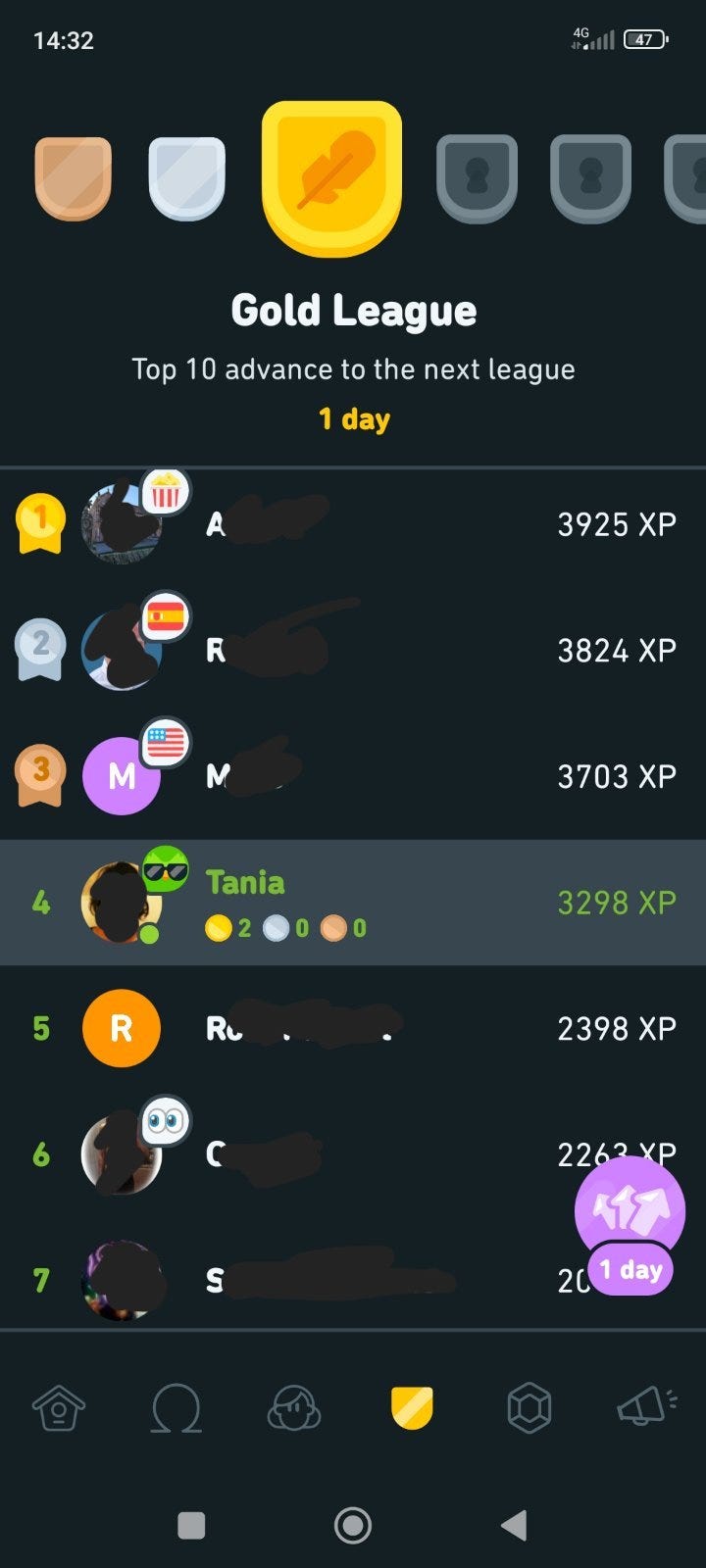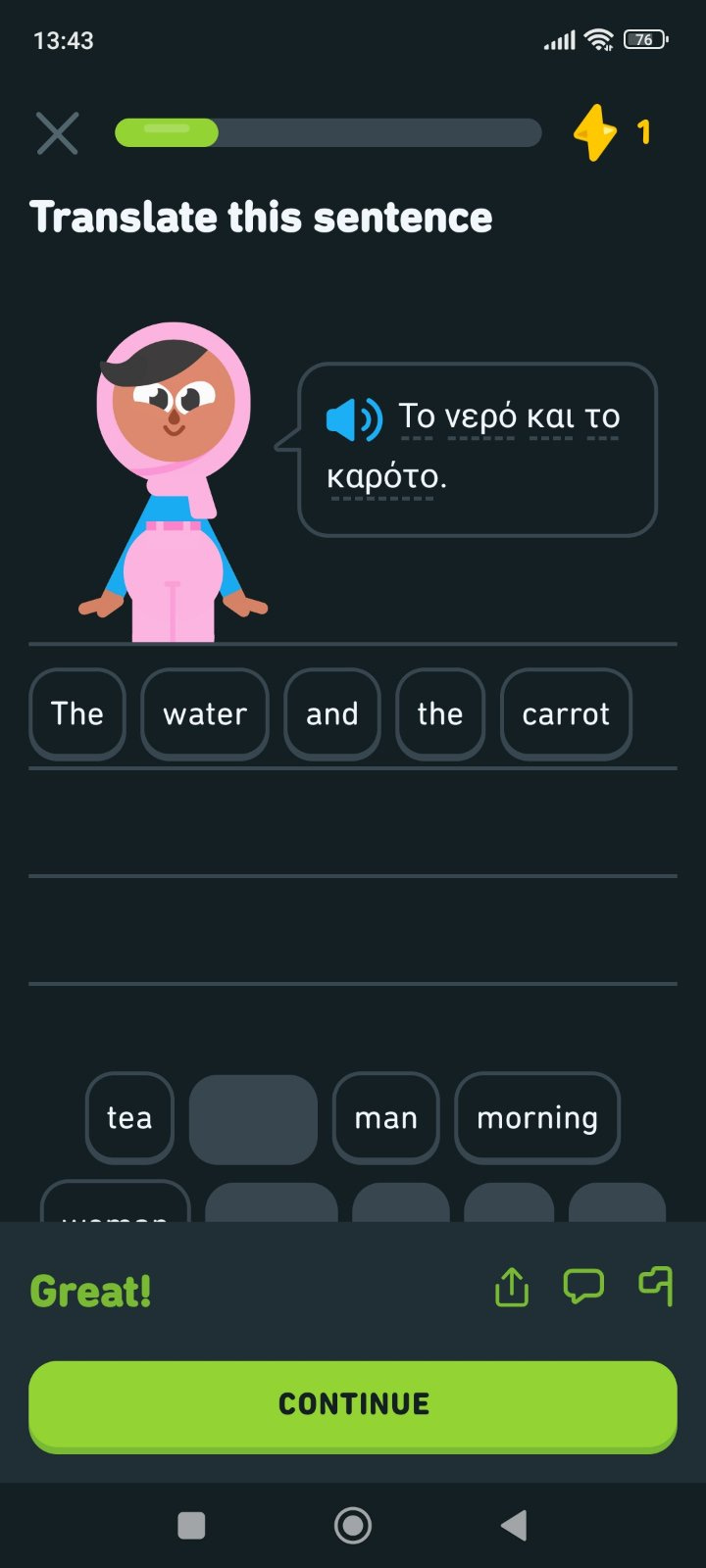#56: Why Would Anyone spend so much time on Duolingo?
Getting hooked on a 'virtuous' app
4am, I woke up. Got up, checked my phone. And got sucked in.
I wasn’t browsing the news, or scrolling through my social media feeds, or playing Sudoku: I was pretending to learn Greek.
I was mindlessly playing on my language app—and feverishly checking the leaderboard after each game, to see where I stood compared to the week’s top 3 players.
At that moment, I wasn’t learning new words or savouring the language’s melody. This wasn’t even about being able to, one day, ask for directions in Crete. I just wanted to beat those Gold League players1. Sure, this isn’t Trainspotting’s toilet scene, but that 4am vortex felt like a mini version of hitting Duolingo rock bottom.
I felt like the app brought out some of my worst traits: the A+ student seeking outside approval; the distracted mum practicing possessive pronouns instead of being present with my children; the queen procrastinator avoiding what I need or want to do. I used to say competition turns me off; well, when I’m that close to the podium it doesn’t.
Learning Greek has been on the list of things I’ve wanted to do since high school; I’m not sure why.
As an adult, I met a few Greek-speaking friends and travelled to Greece once. There, I learnt how to say please and thank you very much, and loved deciphering street signs, or the embroidered words on my friend’s military shorts: ΕΛΛΗΝΙΚΟΣ ΣΤΡΑΤΟΣ—Greek army. I realised that’s where the word Strategy came from, and it blew my mind.
Weeks ago, I remembered that spark after reading an article about hyper polyglot Vaughn Smith. So I dowloaded Duolingo, and soon started playing like a maniac. It started as: Just a few minutes here and there instead of checking Facebook, and in a few days, morphed into series of: Just another game! at 4am.
This isn’t a criticism of Duolingo specifically. (There are other language apps out there, which I haven’t tried, and which may or may not have the same shortcomings.) What I’m interested in here is why and how we (ab)use this kind of gamified apps2.

I still have moments of joy: the satisfaction of sentences clicking into place, understanding grammatical structures, marvelling at words and sounds. And I know that the app’s exercises will not replace learning from real-life situations and interactions.
But mostly, I feel tricked by an endearing, repetitive app that pre-masticates multiple-choice options and passive, mechanical translations, pushing you to jump onto yet another “challenge” for double points.
In a 2019 Medium post, Greg Dickens—another Greek learner who actually lives in Greece—describes the app as “distraction disguised as learning.” He quotes3 Duolingo’s VP of Product Jorge Mazal:
Fluency, Mazal says, isn’t really the goal. “When you’re done using the product,” he says, “you feel like you’re a little bit better as a person. That’s really what people are going for. That’s what we try to give them.”
So the company is trying to sell us a good feeling about ourselves, rather than language skills…! Maybe that’s what feels off.
Ultimately, Duolingo isn’t evil, but it’s a business. They want you to buy and renew their premium subscription; they want you to tell all your friends, and keep coming back. They want to get you hooked—even if getting hooked on learning Esperanto seems more virtuous than getting sucked into random YouTube videos.
But as Nir Eyal said in our podcast interview last week: this isn’t about the activity itself, it’s about how you want to spend your hours.
Maybe you’d rather watch random YouTube videos, or play Scrabble with your neighbour! Or maybe you have no time for, and access to language classes4, and this app is as close as you can get. Maybe you thought foreign languages were not your thing, but playing for virtual rewards—like the app’s crowns, gems, and medals—is fun for you, and has softened some of your bad memories from middle school. Or maybe you’re using Duolingo in long, mindless bouts, and it leaves you feeling drained and sad and you’re hiding in the bathroom to do it.
Now, I’m trying to be more intentional about when and how I use the app. Am I enjoying this? Is my mind available? Am I using the games to escape something that feels hard? I’m not sure if and how long I’ll keep playing, but I’ll try to make that a real decision.
The day that I started my Greek streak, I told a Cypriot friend (who naturally speaks perfect English) about it. But why?! she asked, bewildered.
I can say rice, water, and carrot. I can’t eat anything else, because that’s all the food words I know for now, I joked.
Well, these are three of the ingredients of the soup I’m eating right now, she answered.
I thought Hey, maybe I could learn enough to have an έμβρυο of conversation in Greek with her!
That would be lovely, and is good enough motivation for me.
This isn’t the pinnacle that it sounds like! There are a million more leagues stretching beyond Gold—Sapphire, Diamond; I don’t even know.
You can remove Duolingo’s notifications, animations, and motivational messages in your app settings to tone down the gung-ho cuteness.
The quotes come from a Bloomberg article that has now apparently gone offline.
The basic version is free to use, and Duolingo’s brand message is about making learning fun and free. For instance, they claim that “in Sweden, the most popular language on Duolingo is Swedish, mostly by refugees”.





I tried Duolingo a few years ago when I moved to the Netherlands to learn Dutch. It was fun and I think it help me. But I did not continue, moved to a more traditional class setting and social interactions. I also found reading poetry was a fun way to learn a language. I think you captured the idea here succinctly "I feel tricked by an endearing, repetitive app that pre-masticates multiple-choice options and passive, mechanical translations, pushing you to jump onto yet another “challenge” for double points." And yes, at the end of the day, they need to make money. I like your suggestions about customising it to a tone down version and also finding your own motivations.
This was REALLY interesting, Tania.